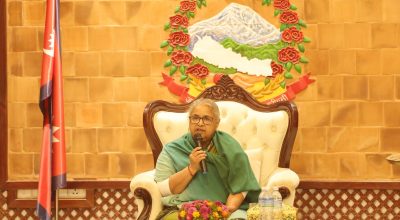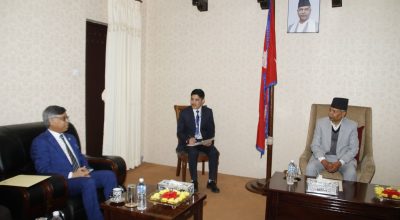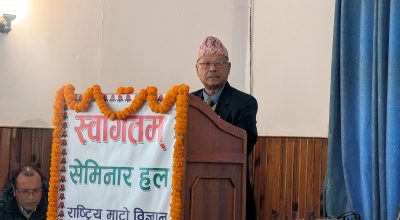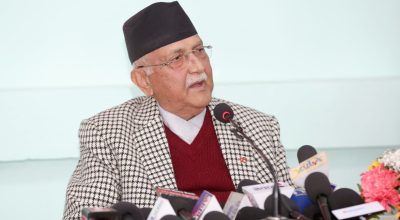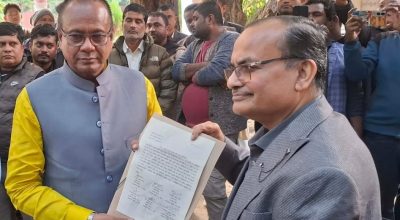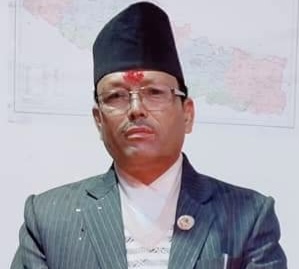
Kathmandu, Dec 11: Narapati Luwar, who was elected the Pradhan Pancha (equivalent to Mayor) of Raskot, Kalikot district, during the Panchayat polity, is currently the Member of the National Assembly, the upper house of the Federal Parliament of Nepal.
It may be noted here that Raskot is a Thakuri majority area and this community dominated the local politics during the then Panchayat system.
It was no small feat for Luwar who belonged to the Dalit community to be elected the Pradhan Pancha amidst the political dominance of the Thakuris at that time.
Historically, the dalit communities were placed at the lowest in the Hindu caste hierarchy and faced various discriminations, including the practice of untouchability, and were socio-economically marginalized.
Reminiscing his youth when people had to carry the essentials like salt, cooking oil, kerosene and clothes on wicker baskets on their back all the way from Rajapur, Bardiya, walking for 15 days and spending nights in the open, in the jungle and in dens, Luwar is fascinated to see motorable roads reaching every ward in the villages these days.
According to Luwar, no matter how bad the condition of roads may be one can reach the district headquarters, Manma, within two hours from any part of the district these days.
Influenced by the political views of CPN (UML) then general secretary Madan Bhandari after reading books by him, Luwar joined the CPN (UML) after the restoration of the multi-party democracy in 1991.
He was elected the Ward Chair in 2049. He said although the armed rebellion waged by the then CPN (Maoist) helped to stop, to some extent, the caste discrimination and the untouchability practice prevalent in society, many elected people’s representatives, including himself, were compelled to leave their villages due to the Maoist’s excesses and threats.
He was taken hostage by the then Maoist rebels three times on the charge of supporting the State. After this, Luwar escaped to Kailali and then to India for eight years to save his life.
He returned to Raskot following the peace talks between the then Maoist party and the seven-party alliance.
He came in contact of his party, the CPN (UML), and was elected the member of the party’s district committee secretariat and later on the party’s provincial committee member.
The CPN (UML) nominated him to the National Assembly in 2074 BS. The upper house lawmaker alleged that although the road and electricity network has expanded, usually almost all the governments at the centre neglected the Karnali region.
In his view, Karnali has developed to some extent compared to the past, but the pace of development is not to the desired extent. Even though the constitution has eliminated the untouchability practice, the caste discrimination still exists and is formidable.
“The caste discrimination is to such extent that a dog is allowed inside the house of the so-called ‘upper caste’ people, but a person from the dalit community is forbidden to enter the house or place of worship,” lawmaker Luwar described the deep-rooted social evil practice in Karnali.
He said that although the women and the dalit communities’ leadership and access has increased in the political parties and various State structures after the country adopted the federal democratic political system, there were still many challenges in securing the constitutionally-guaranteed several rights due to the delay in the implementation of the related laws.
The upper house lawmaker rued that only ‘a handful of people with political access and influence’ had a say in lawmaking and their endorsement even in the upper house considered the permanent house of parliament.
“In comparison to the House of Representatives, the National Assembly has been neglected in every aspect including the budget allocated to it and other facilities. Even the laws are not implemented and rights due to the people not provided equally and even manner,” he complained.
He complained that the Member of the House of Representatives is allocated the Lawmaker Electoral Constituency Development Fund and only they have been assigned as the coordinator of the mechanism responsible for spending the funds.
Luwar feels that the members of the upper house have been discriminated against in this whole system.
He said that the Prime Minister was informed of this disparity, but their suggestions went unheeded.
According to him, all the committees under the Upper House have the authority to observe the development projects, including the so-called national pride projects, and issue directives to the government in connection with these projects.
He opined that the extent of corruption has increased in the country and the good governance has become feeble due to the lack of effective implementation of the existing laws.
“Instances of the culprits in several scams in the country walking scot-free due to their proximity to powerful politicians shows that the State and bodies under it have become negligent in enforcing the laws,” he said.
Stating that he feels the principle of equality before the law and the rule of law is not observed in its letter and spirit in the country at present, lawmaker Luwar said the country would not see good governance and rule of law until this situation is put to an end.
He expressed his worry over the exodus of youths to foreign countries due to the lack of equal education and employment opportunities in the country.
Lawmaker Luwar stressed that blacktopping the road and rural electrification were the priorities in Kalikot district. RSS





